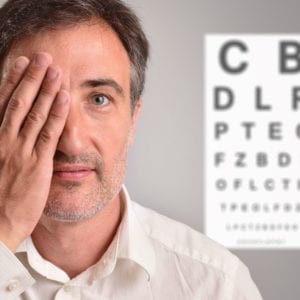
Top Age-Related Vision Changes
There are a few common ways that vision may change with age. These include:
- Having more difficulty reading in low-light. The older we get, the more we may need brighter light to see clearly.
- This condition used to affect approximately 80% of people over age 45. This number is expected to decrease, thankfully. Presbyopia is not a serious eye condition, but it is a common reason for needing bifocals. It occurs when the lenses of the eyes become more rigid, making it difficult to focus on up-close objects.
- Light sensitivities. This can be especially noticeable when driving at night due to glares around lights.
- Dry eyes. A healthy tear film is necessary for comfort when blinking and performing tasks. Tears are produced by the meibomian glands and are spread across the eye when we blink. As we get older, we may experience an imbalance in the tear film that causes it to evaporate too quickly.
Eye Diseases that Threaten Sight
Little changes like light sensitivity and presbyopia can be frustrating but they are not serious. We can correct those problems with generally conservative treatments. What we worry about more is detecting signs of age-related eye diseases as early as possible. Conditions like glaucoma, cataracts, macular degeneration, diabetic retinopathy, and retinal detachment all pose very real risks to eyesight. With advances in medical technology, we can identify early warning signs for these conditions and work to slow or halt their progression.
Protecting the Aging Eyes
There are several ways to support optimal eye health. One is to make sure not to skip routine eye exams. These should take place once a year and should include dilation so the eye doctor can observe all parts of the eye. A regular vision exam only tells us how well you see; it does not provide information about the health of the eye. A dilated eye exam lets the doctor see your cornea, retina, optic nerve, and other vital structures. In between eye exams, eye health can be supported by wearing UV-blocking sunglasses, avoiding harmful habits like smoking, and eating healthy meals that include leafy greens and healthy fats.
We are your partner for optimal eye health. Call (352) 237-8400 to schedule your eye exam in our Ocala, FL office.
